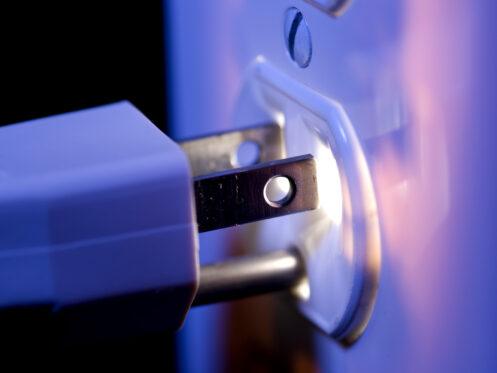As a parent, you are likely highly aware of the myriad potential hazards lurking around every corner of your home. Unfortunately, electrical hazards often tend to fly right under the radar. Electricity powers our lives, but did you know that over 1,000 people lose their lives every year to it? Here are 10 electrical safety tips every parent should know.
1. Guard Against Curious Hands
To a child, those little electrical outlets that dot your walls can be irresistibly tempting on their journey of discovery throughout the house. Of course, they have no idea how incredibly dangerous they can be. One of the first steps toward a safer home for little ones is installing tamper-resistant receptacles or safety covers. They’re simple to install, cost-effective, and can make all the difference in the world when it comes to preventing accidental electrocution.
Likewise, parents need to have age-appropriate conversations about electricity and why kids should never play with outlets. Unfortunately, intelligence lends itself well to solving problems like getting around safety covers long before it imparts the wisdom to know not to do that. Like gun safety, effective electrical safety is about educating children as much as it is about restricting access.
2. Managing the Maze of Cords
We’re in the digital age, and our homes reflect that. Many everyday devices and appliances must be plugged in, from phones and tablets to kitchen gadgets. Unfortunately, the many cords that go along with them all can prove to be deadly. Thankfully, there are numerous inexpensive solutions to this conundrum. A bag of zip ties can all but eliminate those eyesores, tripping hazards, and fire code violations in one fell swoop.
Beyond keeping plugs safely bundled and out of the way, you might want to consider taking a more practical approach to your interior design. A little attention to detail in where you put your appliances can minimize the need for long cords stretching across walkways. For areas where cords come with the territory, like entertainment centers or home offices, label each cord for easy identification. And while we’re talking about cords, take the time to inspect them at least a couple of times a month if you have pets. A frayed plug can spark a devastating fire, and all it takes to prevent a disaster is a glance in the right direction.
3. Feeling the Heat: Unusual Warmth in Walls
Unusual heat can be a telltale sign of serious electrical issues hiding just out of sight. Overloaded circuits, faulty wiring, or malfunctioning appliances can all lead to calamity. Regularly feel around for hot spots, especially near outlets and appliances. You may even notice that your electrical panel is hot. If you notice any abnormal warmth, contact a professional like HR Phoenix for a thorough inspection.
4. The Dangers of Overloading Outlets
Overloading electrical outlets is a risky practice, yet people still do it every single day. Sure, it’s convenient to get one of those six-in-one outlet adapters at the hardware store, but surprisingly few homeowners realize the fact that it can strain the electrical system and increase the risk of overheating. Educate yourself and your entire family about how many devices each outlet can handle. If you absolutely have to turn one outlet into six, at least use a power strip with built-in circuit breakers. If you are using extenders in more than one outlet, invest in an upgrade. HR Phoenix can evaluate your needs and safely install additional outlets so you can power all the electronics in your life without putting your family at risk.
5. Regular Electrical Inspections:
Just like a vehicle, an electrical system in a house needs regular maintenance to function safely. Regular electrical inspections can identify issues like outdated wiring, overloaded circuits, and potential fire hazards. Regular maintenance can also improve energy efficiency and prolong the lifespan of your electrical system.
6. Water and Electricity: A Dangerous Mix
Everyone knows you should never mix water and electricity. Unfortunately, we’re human, and mistakes are made. Perhaps you’re washing dishes while listening to hard rock, go overboard with your headbanging, and next thing you know the GFCI trips and the music fades to a distant memory. Worse, you might have decided to scroll through Facebook while charging your phone and taking a bath.
Set clear rules for your family, including yourself. No making toast in the bathtub, and no rock concerts at the sink. It’s simple advice, but that’s what makes it so effective.
7. The Importance of GFCI Outlets
Ground Fault Circuit Interrupter (GFCI) outlets are a first line of defense against electrical shock, and their use in kitchens and bathrooms has expanded exponentially. As of the 2023 National Electrical Code, GFCIs are required for all outlets in the room. That’s a departure from the old standard of within a specified distance from water, but we think it makes sense.
This safety feature works by detecting imbalances in the electrical current and is designed to prevent electrocution. They work on the same principle as a breaker in your utility room, and they most certainly save lives.
8. Teach Your Kids About Electrical Safety
Teaching children how to navigate the world around them without getting hurt is one of a parent’s primary goals. Electrical safety is no exception. Teach your children basic safety practices, like avoiding yanking cords from walls or inserting objects into outlets. Engage your children and draw them into the learning experience by using safety videos or books.
9. Safe Use of Extension Cords
Extension cords are great, but they also happen to start over 330 house fires every single year in the United States. Both adults and children should know how to use extension cords safely. That means don’t run them under carpets or around door frames, don’t use them if they’re full of knots and just as full of shorts, and never just leave them plugged in and unattended. We can’t stress this enough. According to the US Consumer Product Safety Commission, more than 70 people die as a direct result of extension cord fires every year in the US.
10. Preparing for Electrical Emergencies
Emergency preparedness is so important that the United States Department of Homeland Security set up Ready.gov to teach people how to prepare for every emergency. However, only 29% of Americans have an emergency plan in place. Obviously, stockpiling shelf-stable food and bottled water is good for most emergencies, but even those with emergency preparedness kits may lack electrical safety basics like an electrical burn kit, fire extinguishers rated for an electrical fire, and basic electrical safety knowledge like keeping away from downed power lines and transformers and wearing rubber gloves and rubber-soled boots whenever you have to use electrical tools in a wet environment.
Don’t hesitate to call on the experts if you have any questions about electrical safety. Our team at HR Phoenix is always here to help whether you’re doing a full renovation or just have a few questions. We offer residential and commercial electrical services, such as rewiring, electrical repairs, electrical panels, EV charging stations, and generators. Our team also handles a wide range of plumbing needs. Contact us today to learn more.


